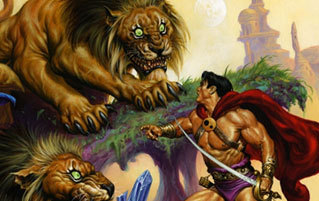5 WTF Old-Timey Sci-Fi Genres That Were Hugely Popular

Some book genres are incredibly long-lasting. The simple mystery novel has never really gone out of style, science fiction and fantasy are a century or more old and still going strong, and romance authors have turned that one plot they have into thousands of bodice rippers, with no signs of slowing down yet.

When the first amphibians crawled onto land, they brought with them primitive tales of bodice ripping.
But other genres come and go, as evidenced by the wave of zombie and vampire novels that I guarantee will not be widely read by the cultured residents of TomorrowLand. And we can see the same when looking at the books of bygone eras, where we find literary styles that were once incredibly, even implausibly popular that now evoke only a sensation of "What?" or "What were they smoking?"

The books themselves?
No, friend, they were smoking the thinking of their time, a pungent zeitgeist packed deep in the bowel of their minds, throwing off the smoke of incredible stories and ideas. Also, incredibly colonialist and/or racist stories and ideas.
So hold on to your butts.
Sword and Planet
The sword-and-planet genre contains, as one might deduce, both swords and planets, combined in a very specific manner. It essentially involves an Earthman traveling to an alien planet by some loosely explained means, where he meets the humanlike but surprisingly primitive locals and goes on all sorts of adventures with them, which basically just means stabbing things with a sword.

"I come in peace. But I'm not staying in peace, or behaving in peace, or anything sissy like that."
Although nominally science fiction-based, sword-and-planet stories feature very little discussion on the scientific details of how any of this is possible. Can an Earthman breathe the atmosphere of Venus? Sure. Stop asking questions. How did he get there? Astral projection? Yes, fine.

Or this, apparently.
The prototypical sword-and-planet story is probably the Barsoom series of books by Edgar Rice Burroughs. These stories feature John Carter, a confederate officer who somehow makes his way to "Barsoom" (Mars) to stab lots of Martians. (You might remember this character from the movie version you didn't see.) And then there's The Outlaws of Mars by Otis Adelbert Kline, which features, no lie, Jerry of Earth, who travels to Mars only to find himself, within seconds of arriving, meeting a beautiful princess and murdering her pet.

Perhaps the greatest meet-cute ever written.
Sword-and-planet stories haven't completely faded away, of course, some of their principles living on in aspects of other science fiction (Star Wars' lightsabers, most notably). But the central premise of a "civilized" man arriving and fixing the natives' problems with his civilized brains and civilized brawn has faded away. Which is perhaps for the best.

Even if it means we've lost the art of pet-stabbing introductions.
School Stories
School stories were a genre of novels and stories set in English boarding schools, a form of schooling that reached its peak in the late 19th and early 20th centuries, an era when the English apparently wanted nothing to do with their own children, busy as they were maintaining their empire.

"Ahh, Reginald. You're born. Tremendous. We're off now. Terribly busy with the crumpets in the lorry factory
in Ceylon, you know. See you in 16 years."
The stories are all typically written from the perspective of the students and focus on life in boarding schools. Bullies and bizarre school sports feature heavily, as do themes of friendship, honor, and penmanship.

The popularity of the stories waned alongside the waning popularity of boarding schools themselves, as the English decided that, no, they didn't hate their children that much after all.

A policy they're only now starting to reconsider.
Nowadays we don't really see many boarding school novels, with one notable exception, and even in that case, it was only the hoary creative technique of magic that could conceal how implausible it was that parents would send their children to a school with such a horrifically bad safety record.

Invasion Literature
In 1871, a story called "The Battle of Dorking" was published in an English magazine that depicted an invasion of England by some unnamed villains who happened to speak German.

So Namibia, presumably.
As depicted in the story, the British military is woefully underprepared for such an invasion and is quickly rolled over, the British Empire falling and the world never knowing the Beatles.

Only their Germanic replacement, Die Kakerlaken.
Interestingly, the British loved the idea of being invaded by a foreign power, and hundreds of books with similar plots soon flooded the market, each one of them featuring England being invaded by basically every country on the planet. The Great War in England in 1897 had France and Russia as the aggressors and Germany as the ally, because why not? The same author got the sides right a few years later when he wrote The Invasion of 1910, this time featuring Germany in their traditional place as villains. That work is made particularly hilarious by the fact that it was soon pirated and published illegally by the Germans, who translated it and changed the ending to make the Germans win.

"Ja, sounds about gut to me."
Perhaps the best known work in the genre is H.G. Wells' The War of the Worlds, which swaps in Martians for Germans, but otherwise maintains all the London-stomping themes.

Including an allusion to Germans' well known vulnerability to Earth microbes.
The appeal of these stories is obvious; they fulfill a kind of persecution fantasy, allowing a group to see themselves as the victims, fighting an absolutely moral war (what could be more moral than defending your own home?). And although the specific genre of "everyone invades Britain" has faded away, this concept has actually stuck around in other formats.

The only thing Red Dawn invented was the practice of yelling "Wolverines!" at people you're about to shoot.
Robinsonades
Robinson Crusoe is a fairly well known novel about a castaway who spends years living on a desert island. Using the powers that all white men have, he civilizes the island entirely by himself, building a nice little compound with functioning raisin farm, and then in his spare time convinces a nice dark-skinned fellow to believe in God. In short, the book is extremely politically correct, so long as the politics in question are 300 years old.

"Also, womynfolk should not own lands or printed works."
Despite this (or not), the book caught the public imagination and became popular enough to spawn many imitators, becoming the namesake for a brand new genre, the Robinsonade. The typical Robinsonade involved a white protagonist getting shipwrecked on a desert island, bringing some version of civilization to this savage and untamed land, and commenting on the relative benefits and weaknesses (mostly the benefits) of civilization in general.
Somewhat surprisingly, the protagonists, although always from the Western world, weren't always men. Two Years' Vacation has shipwrecked children building their own wonderful little society and also incidentally foiling some slave traders. And the delightfully titled Baby Island features two teenage girls raising four babies on a desert island after a slightly implausible-sounding mishap. And of course there's the varied selection of castaways on Gilligan's Island.

A show well known for its high-minded insights on society and civilization.
In most cases, the civilization the protagonists install is presented as working well, often even a borderline utopia. In The Swiss Family Robinson, for example, I think by the end of it they build a functioning hydroelectric dam out of loose bits of rope. On the other hand, the trope was sometimes inverted, the society the protagonists founded quickly collapsing due to some inherent flaw of the civilization itself. This is best seen in The Lord of the Flies, which features a group of shipwrecked boys who resort to cannibalism within about seven minutes of washing up on shore.

Although if you've ever seen boys playing unsupervised, seven minutes to cannibalism might actually be considered a naive assumption.
Edisonades
And finally we come to the Edisonade, possibly the craziest and certainly the raddest genre lost to the winds of time. In the same way that the Robinsonade genre was named after Robinson Crusoe, the Edisonade was named after Thomas Edison, whom the more astute of you will recognize is not a fictional character. In this case it refers to Thomas Edison's many, many inventions, with the typical Edisonade featuring a similar brilliant young inventor who solves problems with his brilliant young inventions. The inventor would take his invention (not explicitly a weapon, but certainly bristling with them) into "the frontier," in the process claiming it or civilizing it or just shooting a bunch of its residents a whole bunch.

Somewhere out there a proud and noble people is waiting to be civilized by a man atop a giant mechanical spider.
Edisonades were found mainly in pulp magazines and novels around the turn of the century and featured fantastic rambling titles like "The Steam Man of the Prairies" and "Jack Wright and His New Electric Horse" and "Frank Reade, Jr's Electric Air Canoe; or, The Search for the Valley of the Diamonds" and "Tom Swift and his Wizard Camera; or, Thrilling Adventures When Taking Moving Pictures." Also, my personal favorite, "Electric Bob's Big Black Ostrich."

Which thankfully isn't a lame-ass metaphor or anything.
It's this central belief of the Edisonade, the certainty of the all-civilizing, all-conquering power of technology, that looks so dated now. Although fascination with new technology still exists and can be regularly seen in science fiction, that genre is just as likely to focus on the negative aspects of new technology as well. And for good reason. After a century of witnessing the sometimes negative impacts new technology can bring, from pollution, to societal upheaval, to nuclear winter, we've rightfully adopted a slightly more skeptical view of it.

Too many lives have been cut short by mechanical ostriches for us to stay so naive.
Chris Bucholz is a Cracked columnist and writes regular dispatches from his home atop a massive mechanical ostrich. Join him on Facebook or Twitter to beg for your lives.
Always on the go but can't get enough of Cracked? We have an Android app and iOS reader for you to pick from so you never miss another article.
